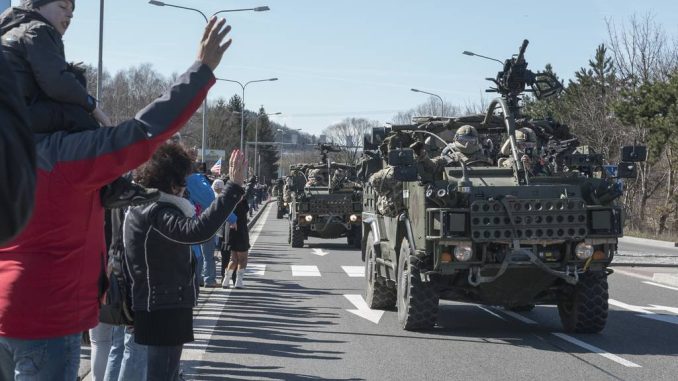
A week after announcing that 8,500 troops have been put on heightened alert to possibly deploy in response to a Russian incursion into Ukraine, the Defense Department is signaling that more troops could be called up.
In addition to what the U.S. might send to support the NATO Response Force, Pentagon spokesman John Kirby told reporters Monday that solo deployments might be on the table.
“We are in active discussions with a number of allies about U.S. capabilities that they might desire,” Kirby said. “But again, I don’t have any final decisions to speak to today.”
Kirby had told reporters on Tuesday that some of those 8,500 could be tapped for individual deployments to allied countries. He could not say Monday how many more troops might be called up in addition.
President Joe Biden on Friday told reporters as he landed at Joint Base Andrews, Maryland, that he would be calling up troops for a Europe deployment.
“I’ll be moving troops to Eastern Europe and the NATO countries in the near term — not a lot,” Biden said.
The Pentagon has said that the troops tapped Jan. 24 were simply on heightened alert, shortening their recall times to deploy with five days’ notice, rather than 10 days, for example.
RELATED
:quality(70)/cloudfront-us-east-1.images.arcpublishing.com/mco/7JJO7BHR6JHKNKC5H4DXX2IEDI.jpg)
“We have shortened the alert status for more than 8,000 U.S. troops … and they’re making the preparations that they need now to be able to meet that shorter tether, but there’s been no decision to activate it,” Kirby said. “As for the addition of forces or capabilities into the eastern flank of NATO, you heard the president make very clear what his intentions are. I don’t have any announcements to make today.”
Though the talk of calling up troops is in response to Russia’s military build-up along its border with Ukraine, none of them will actually go to Ukraine if deployed.
“… the President has been very clear: we’re not going to see American troops on the ground in combat with the Russians and Ukraine,” Kirby said. “He has made clear that that’s not on the table.”
RELATED
:quality(70)/cloudfront-us-east-1.images.arcpublishing.com/mco/A6OFN5FAJJHYZEVCVH7GFX5UGA.jpg)
Rather, he said, possibly deploying thousands to Eastern Europe would be a show of solidarity with NATO countries, above and beyond troops already stationed in Germany, for example, or in countries like Poland and Lithuania on a rotational basis.
“We want to make sure that our NATO allies understand we take seriously our commitments to them,” Kirby said. “And so if they desire if they want additional capabilities, particularly in those eastern flank countries, to bolster their own self defense, then we want to have that conversation with them.”
Meghann Myers is the Pentagon bureau chief at Military Times. She covers operations, policy, personnel, leadership and other issues affecting service members. Follow on Twitter @Meghann_MT



Be the first to comment